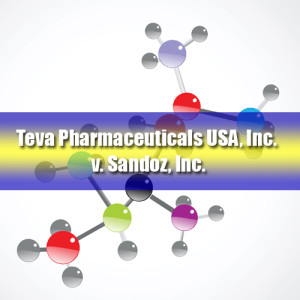Teva Pharmaceuticals USA, Inc. v. Sandoz, Inc.

In Teva Pharmaceuticals USA, Inc. v. Sandoz, Inc. 574 U.S. __ (2015), the U.S. Supreme Court addressed the legal standard that the Federal Circuit Court of Appeals must apply when considering the construction of a patent claim. By a vote of 7-2, the Court determined that Federal Rule of Civil Procedure 52(a)(6) requires that the appeals court only overturn a district court’s claim construction if it is “clearly erroneous.”
The Facts of Teva Pharmaceuticals USA, Inc. v. Sandoz, Inc.
Teva Pharmaceuticals owns a patent for the multiple sclerosis drug Copaxone. When Sandoz, Inc. sought to market a generic version of the drug, Teva filed a patent infringement suit. Sandoz countered that the patent was invalid, alleging that the claim that Copaxone’s active ingredient had “a molecular weight of 5 to 9 kilodaltons” was fatally indefinite because it failed to state which of three methods of calculation—the weight of the most prevalent molecule, the weight as calculated by the average weight of all molecules, or weight as calculated by an average in which heavier molecules count for more—was used to determine that weight.
After considering conflicting expert evidence, the District Court concluded that the Teva held a valid patent. It specifically that a “person of ordinary skill in the art” would understand that the term “molecular weight” referred to molecular weight as calculated by the first method. In finding the “molecular weight” term indefinite and the patent invalid on appeal, the Federal Circuit reviewed de novo all aspects of the District Court’s claim construction, including the District Court’s determination of subsidiary facts.
The Majority Decision on Teva Pharmaceuticals USA, Inc. v. Sandoz, Inc.
By a vote of 7-2, the Court concluded that the appeals court erred in applying a de novo standard of review. In so ruling, the justices changed the standard of review that is applied to claim construction findings. Justice Stephen G. Breyer authored the majority opinion.
“When reviewing a district court’s resolution of subsidiary factual matters made in the course of its construction of a patent claim, the Federal Circuit must apply a ‘clear error,’ not a de novo, standard of review,” the Court ruled. In reaching its decision, the majority highlighted that the “clearly erroneous” standard set forth in Federal Rule of Civil Procedure 52(a)(6) should be applied to all findings of fact, and patent cases are no exception.
As Justice Breyer further explained:
Rule 52 requires appellate courts to review such disputes under the “clearly erroneous” standard. Application of this standard is further supported by precedent and by practical considerations. Clear error review is “particularly” important in patent cases because a district court judge who has presided over, and listened to, the entire proceeding has a comparatively greater opportunity to gain the necessary “familiarity with specific scientific problems and principles,” Graver Tank & Mfg. Co. v. Linde Air Products Co., 339 U. S. 605, 610, than an appeals court judge who must read a written transcript or perhaps just those portions referenced by the parties.
The Dissent of Teva Pharmaceuticals USA, Inc. v. Sandoz, Inc.
Justices Samuel Alito and Clarence Thomas dissented. They argued that the Federal Circuit was correct in applying de novo review because claim construction determinations are not akin to findings of fact. Rather, the dissenters maintain that patent claim constructions are more analogous to statutes and should be considered issues of law.
Previous Articles
SCOTUS Decision in Bowe v. United States Is First of the 2026 Term
by DONALD SCARINCI on February 5, 2026
In Bowe v. United States, 607 U.S. ___ (2026), the U.S. Supreme Court held that Title 28 U.S.C. § ...
SCOTUS Rules State Can’t Immunize Parties from Federal Civil Liability
by DONALD SCARINCI on January 29, 2026
In John Doe v. Dynamic Physical Therapy, LLC, 607 U.S. ____ (2025) the U.S. Supreme Court held that...
Supreme Court to Address Racial Discrimination in Jury Selection
by DONALD SCARINCI onWhile the U.S. Supreme Court has concluded oral arguments for the year, it continues to add cases t...
The Amendments
-
Amendment1
- Establishment ClauseFree Exercise Clause
- Freedom of Speech
- Freedoms of Press
- Freedom of Assembly, and Petitition
-
Amendment2
- The Right to Bear Arms
-
Amendment4
- Unreasonable Searches and Seizures
-
Amendment5
- Due Process
- Eminent Domain
- Rights of Criminal Defendants
Preamble to the Bill of Rights
Congress of the United States begun and held at the City of New-York, on Wednesday the fourth of March, one thousand seven hundred and eighty nine.
THE Conventions of a number of the States, having at the time of their adopting the Constitution, expressed a desire, in order to prevent misconstruction or abuse of its powers, that further declaratory and restrictive clauses should be added: And as extending the ground of public confidence in the Government, will best ensure the beneficent ends of its institution.





